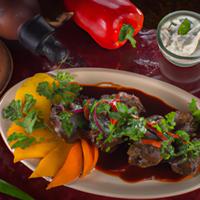
1 serving (50 grams) contains 216 calories, 2.5 grams of protein, 6.0 grams of fat, and 37.5 grams of carbohydrates.

Log this food in SnapCalorie

Nutrition Information
Calories |
1028.6 | ||
|---|---|---|---|
% Daily Value* |
|||
| Total Fat | 28.6 g | 36% | |
| Saturated Fat | 11.9 g | 59% | |
| Polyunsaturated Fat | 0 g | ||
| Cholesterol | 0 mg | 0% | |
| Sodium | 119.0 mg | 5% | |
| Total Carbohydrates | 178.6 g | 64% | |
| Dietary Fiber | 2.4 g | 8% | |
| Sugars | 107.1 g | ||
| protein | 11.9 g | 23% | |
| Vitamin D | 0 mcg | 0% | |
| Calcium | 47.6 mg | 3% | |
| Iron | 2.4 mg | 13% | |
| Potassium | 119.0 mg | 2% | |
* Percent Daily Values are based on a 2,000 calorie diet. Your daily values may be higher or lower depending on your calorie needs.
Food Attributes
Source of Calories
About Jangri
Jangri, also known as Imarti, is a popular South Asian sweet made from urad dal (split black gram) batter, deep-fried in circular, intricate shapes, and dipped in sugar syrup. Originating from Indian cuisine, this vibrant orange dessert is a festive favorite, especially during celebrations and weddings. The main ingredients include urad dal, sugar, ghee or oil for frying, and sometimes food coloring for its signature hue. While Jangri provides a source of energy due to its high carbohydrate content from the sugar, it is also rich in protein thanks to the urad dal base. However, it is not considered a health food due to its high sugar content and deep-frying process, which make it calorie-dense. Best enjoyed in moderation, Jangri remains a beloved treat that symbolizes indulgence and festivity.



